Xi Jinping, Vladimir Putin present anti-US plan
A joint statement by China and Russia was meant to instil fear around the world. But there’s a detail that exposes a huge lie.
Chairman Xi Jinping is on top of the world. He’s succeeded where the US failed in repairing diplomatic relations between Saudi Arabia and Iran.
He’s walked out of his meeting with Russia’s President Vladimir Putin with promises of support for his new “Global Civilisation”.
So, what’s next?
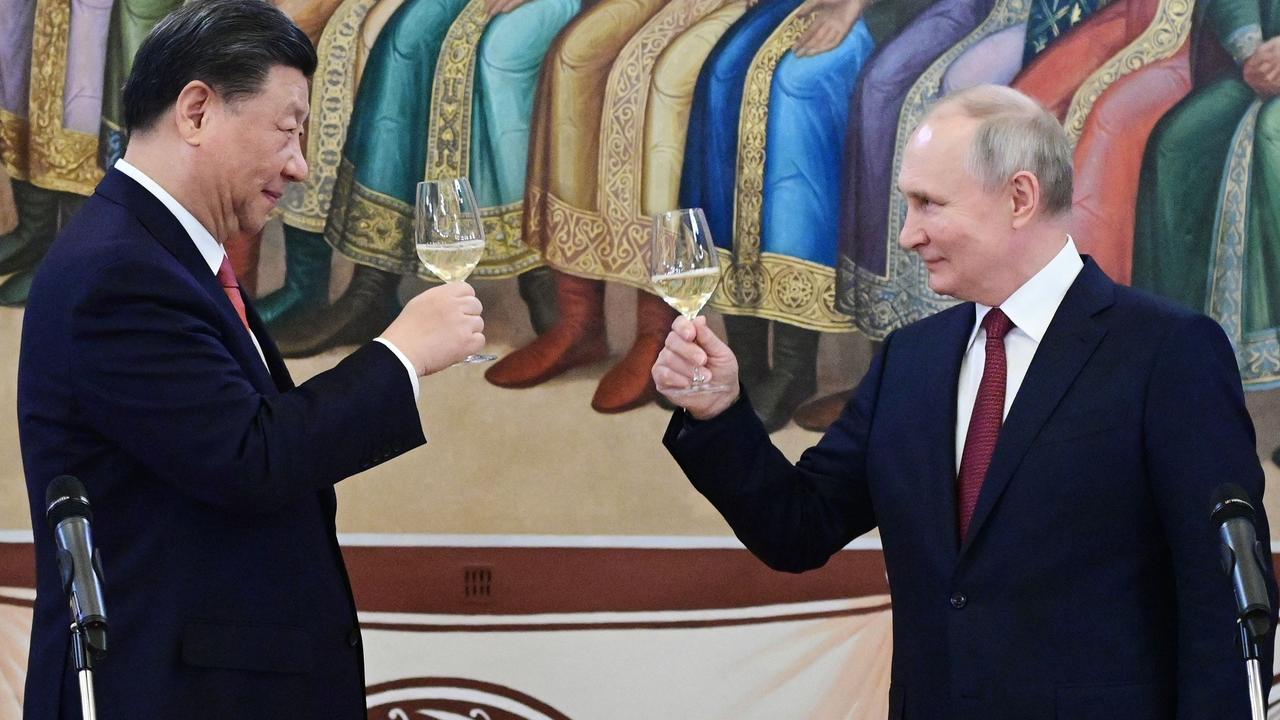
Xi summed up the first weeks of his controversial third term as general secretary of the Chinese Communist Party and chairman of the Central Military Commission in an apparent “hot mic” moment.
“Right now, there are changes the likes of which we haven’t seen for 100 years. And we are the ones driving these changes together.”
“I agree,” Putin said as they shook hands before Xi boarded his plane back to Beijing.
"Right now there are changes, the likes of which we haven't seen for 100 years," Mr. Xi told Mr. Putin through an interpreter after the state dinner as the leaders bid farewell. "And we are the ones driving these changes together.†pic.twitter.com/0Q9cGfWLKl
— Valerie Hopkins (@VALERIEinNYT) March 21, 2023
Moments before, the two leaders had lashed out at the West for creating a “multipolar world”. They blamed the United States for “undermining international and regional security and global strategic stability … to maintain its own unilateral military superiority.”
Putin expressed Russia’s “appreciation” for Xi “upholding an objective and impartial position on international affairs”.
“Russia attaches great importance to China’s Global Civilization Initiative,” the joint leaders’ statement reads. “Different civilisations and countries should respect, tolerate, communicate with and learn from each other. The two sides will unswervingly advance the cause of human rights in their own countries and the cause of human rights in the world.”
It’s a diplomatic barb directed at Washington and the United Nations.
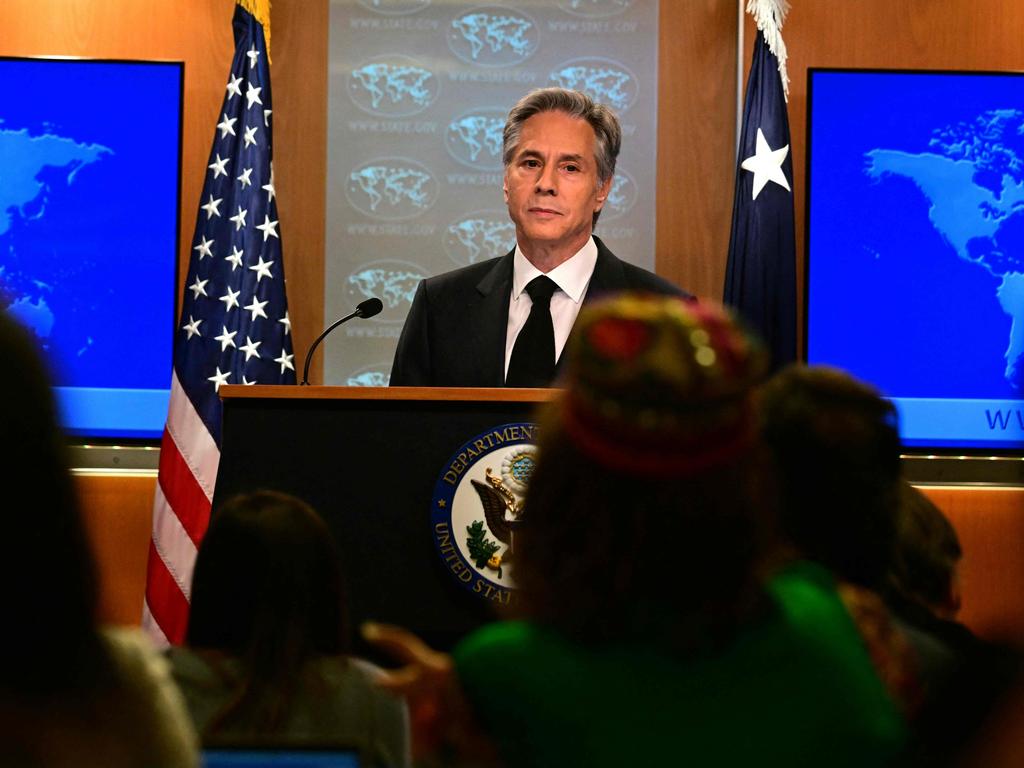
“I think a lot of countries may find this more appealing than the Biden Administration’s “Democracy vs Authoritarianism” framing,” comments China analyst Bill Bishop.
But Flinders University professor of international history Matthew Fitzpatrick told News.com.au he believes the real purpose behind Xi and Putin’s posturing can be found in the detail of their joint statement.
“Whatever the dangers we face at the moment, we face them as a result of material factors that have more to do with trade, security and energy than any idea that there is a fundamental difference in civilisation between East and West,” he says. “The idea that there is an unbridgeable divide is the kind of thinking that will get us into real trouble”.
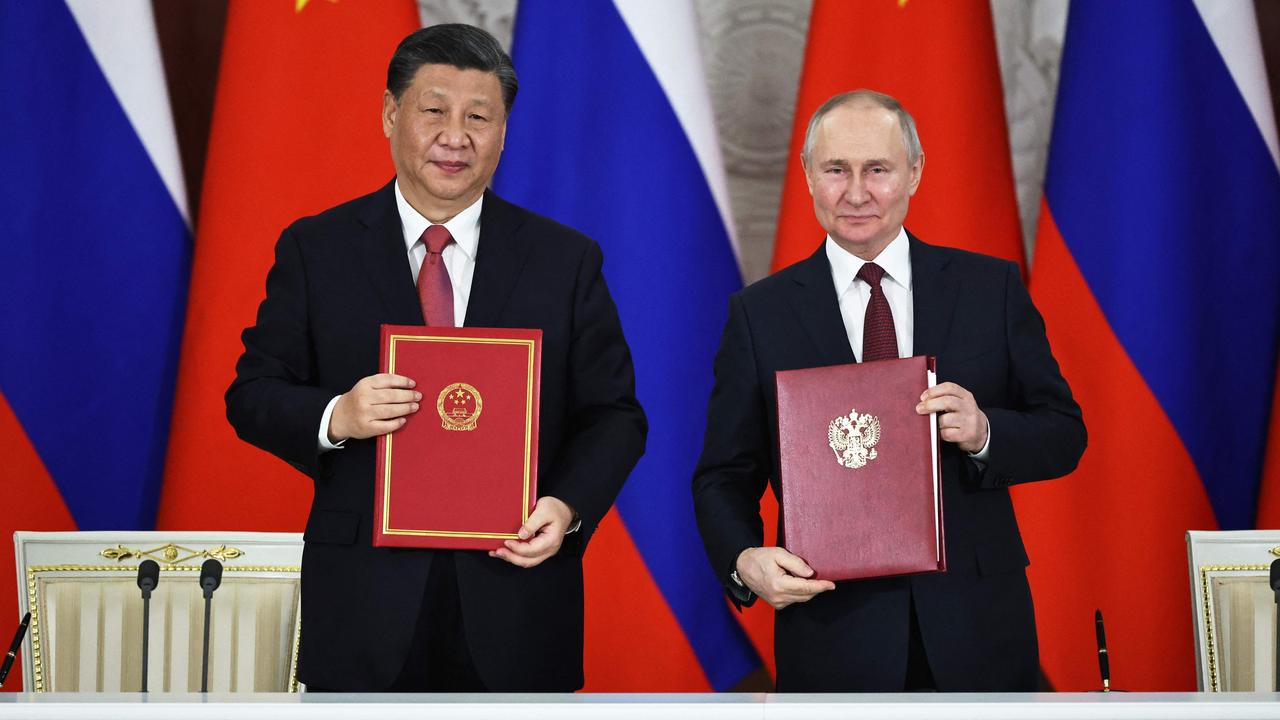
‘Good neighbours’
“The Book of Changes, which is a true compendium of the wisdom of Chinese civilisation, says, ‘If people have commonality in their souls, their combined strength becomes so great that it can cut the strongest metal and overcome any obstacle’,’” Putin proclaimed in a toast to his guest at a Kremlin function this week.
Xi replied: “In the face of changes in the world, the times and history, China and Russia managed to maintain strategic restraint. Our relations have become stronger, more mature and stable. We have set an example – a model – of relations between great powers.”
Both leaders were keen to promote their relationship as the core of an alternative power bloc to that of the West.
“As permanent members of the UN Security Council and major countries in the world, China and Russia have natural responsibilities to make joint efforts to steer and promote global governance in a direction that meets the expectations of the international community and promote the building of a community with a shared future for mankind,” their joint statement reads.
But their message strikes a discordant note.
In March last year, an emergency session of the UN General Assembly voted on a resolution deploring Russia’s invasion of Ukraine and demanding it withdraws its troops. It was formally sponsored by 96 of the UN’s 193 members. The official tally lists 141 voting in favour, 5 against, and 35 abstentions.
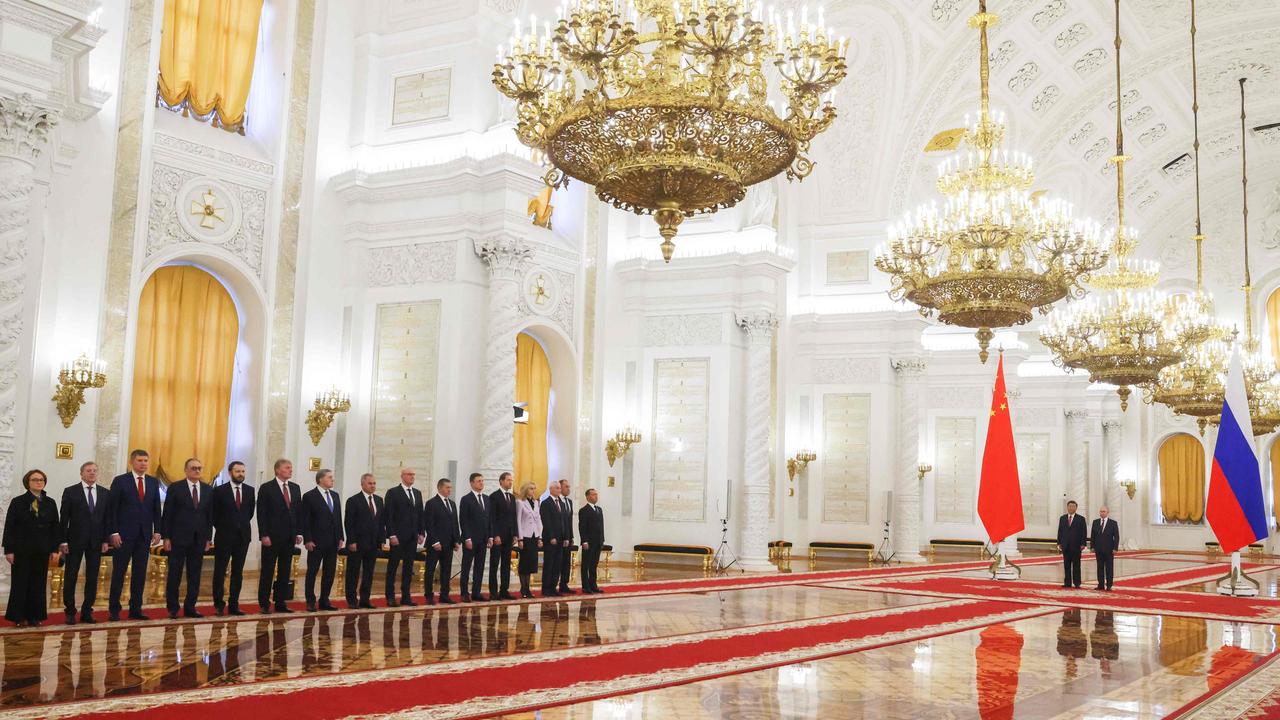
Meanwhile, Beijing’s military has continued escalating its presence in the contested Himalayan mountains and in the waters of the East and South China Seas. It has also wielded its economic influence against Australia, Lithuania and South Korea for criticising its policies. And its ‘wolf warrior’ diplomats have unleashed torrents of insults and abuse.
But the underlying diplomatic message remains consistent.
“Xi noted that changes unseen in a century are evolving faster, and the international balance of power is undergoing a profound shift,” the state-controlled Global Times declares.
Global Civilisation – according to Xi
“We advocate the common values of humanity. Peace, development, equity, justice, democracy and freedom are the common aspirations of all peoples,” Xi proclaimed while detailing his vision of a new global future. “Countries need to keep an open mind in appreciating the perceptions of values by different civilisations, and refrain from imposing their own values or models on others and from stoking ideological confrontation.”
It’s a message likely to be well-received in the developing world, argues Manoj Kewalramani, chairman of the Indian think-tank Takshashila Institution.
“It all sounds much better than getting lectures from Western visitors.”
It’s a point Xi was keen to push at the CCP’s Dialogue with World Political Parties High-Level Meeting earlier this month.
“It is the people of a country that are in the best position to tell what kind of modernisation best suits them. We should respect and support the development paths independently chosen by different peoples to jointly usher in a new prospect for humanity’s modernisation that is like a garden where a hundred flowers bloom.”
Xi, however, sees no cause for Beijing to change its course.
“We will stay committed to the right direction, the right theories and the right path. We will not veer off course by changing our nature or abandoning our system.”
Kewalramani says the strength of Xi’s rhetoric reveals how much the relationship between the US and China has deteriorated and Beijing’s growing desire to push back against Washington’s values-based narrative.
“The reality is that as China’s interests and influence expand, so too is its interference in the domestic politics of countries. Just look around the Indian subcontinent,” he writes. “China is a key component of domestic political discourse and electoral politics in Pakistan, Nepal, Sri Lanka, and the Maldives. So, there’s a limit to which this rhetoric works.”

Russia, China fake relationship exposed
Hints at the true motives of Xi’s visit with Putin can be found in the detail of their joint statements.
Both sides agreed to strengthen co-operation in preventing “colour revolution” against each other’s regimes, to crack down on dissenting “forces” such as the East Turkistan Islamic Movement (Xinjiang resistance group), and co-operate in the fight against international organised crime.
“What’s probably more important is what wasn’t said,” says Professor Fitzpatrick. “There’s no rousing endorsement of the Russian war on Ukraine. And there’s at least the appearance of an attempt at a peace plan.”
And this is why fears of an “axis of authoritarians” are overblown, he says. “There’s not a simple level of mutual interest between authoritarian states beyond a sense that none of them wants to submit to what they consider to be US domination”.
Likewise, he believes not all nations perceive their threat in the same way as the West.
“Thailand, Malaysia … all of these places have been living under the shadow of China for a very long time,” Professor Fitzpatrick says. “That’s not to say that they disagree entirely with Australia or agree entirely with China. But they have a different perspective.”
And Xi’s true vision may be different from the one he broadcasts.
“What struck me is Xi came away with an energy security agreement for China. The building of a new pipeline, of new infrastructure,” Professor Fitzpatrick explains.
It’s a move that both reduces Beijing’s need to secure the South China Sea, and enables it to do so. “The naval tension at the moment has everybody’s eyes fixed on the same sea lanes, and everybody understands that an attack by one would disadvantage the other in some way. If Xi can circumvent that concern, then that may make it easier for him to relax into his main projects – domestic consolidation, modernisation, and urbanisation.”
Brinkmanship remains a threat, he adds. “Stepping up to the precipice of war and then trying to step back sometimes backfires spectacularly. But I’m not convinced that a kinetic fight for territory sits just over the horizon”.
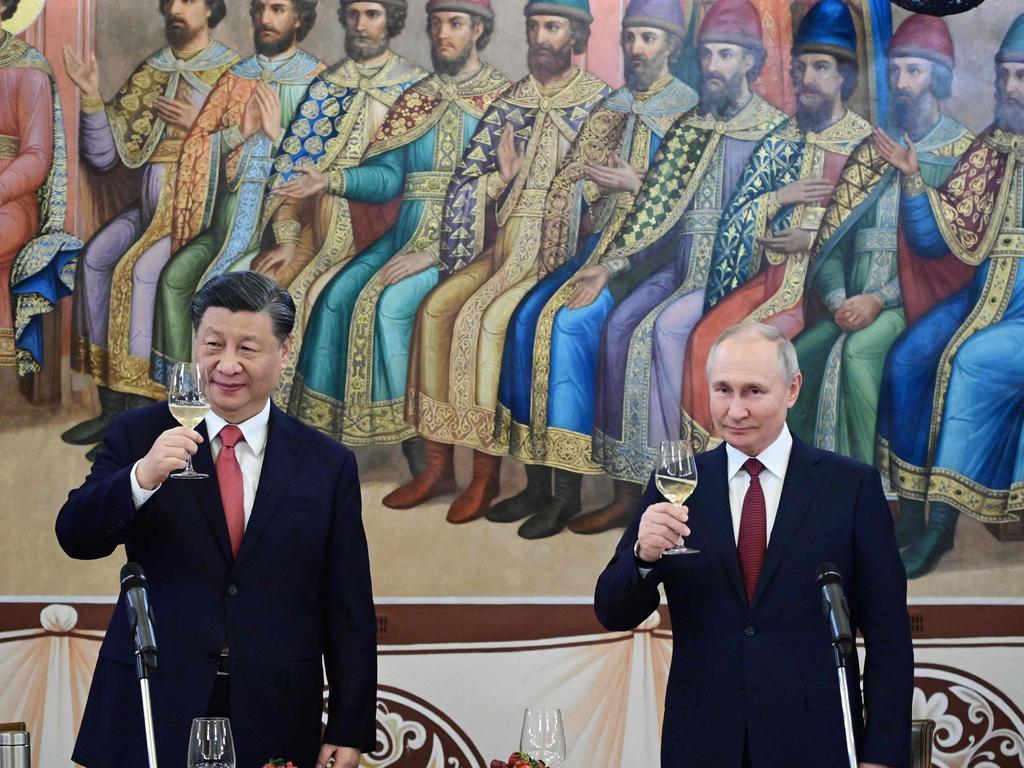
Legion of doom?
“The CCP will continue to safeguard international fairness and justice and promote world peace and stability. In advancing modernisation, China will neither tread the old path of colonisation and plunder, nor the crooked path taken by some countries to seek hegemony once they grow strong … The world does not need a new Cold War,” Xi said of his ideal “civilised” future.
Professor of international politics at the Fletcher School of Law Daniel Drezner noted the irony in those words.
“It sometimes seems as though the United States has inspired its own less comical Legion of Doom,” he writes.
“It is difficult to deny that Russia, China, Iran, North Korea, et al are taking actions that run contrary to US interests. It is not obvious, however, that the co-operation between these countries is anything more than tactical in nature.”
They are all keen to shake off US-imposed constraints, he says. And Russia is desperate for support from any direction.
“All of the historical grievances and anxieties that Russia, China, and Iran have in dealing with each other have not magically disappeared,” Professor Drezner explains. “They have simply been sublimated by their collective resistance to US pressure.”
But casting the dispute as a clash of civilisations dramatically elevates the risk of war, says Professor Fitzpatrick. “This idea that there’s a kind of incommensurability between peoples should be resisted. Particularly when it comes to things as serious as security and defence.”
And the outcome of war is a “roll of the dice”.
“Large powers know that as much as small powers,” he says. “It’s much easier to look strong and bargain hard at the table than to risk everything in a war you ultimately may not win. I remain convinced that diplomacy is our best bet in all of these scenarios.”
Russia, Professor Fitzpatrick says, has rolled that dice. And that marks it as an international pariah.
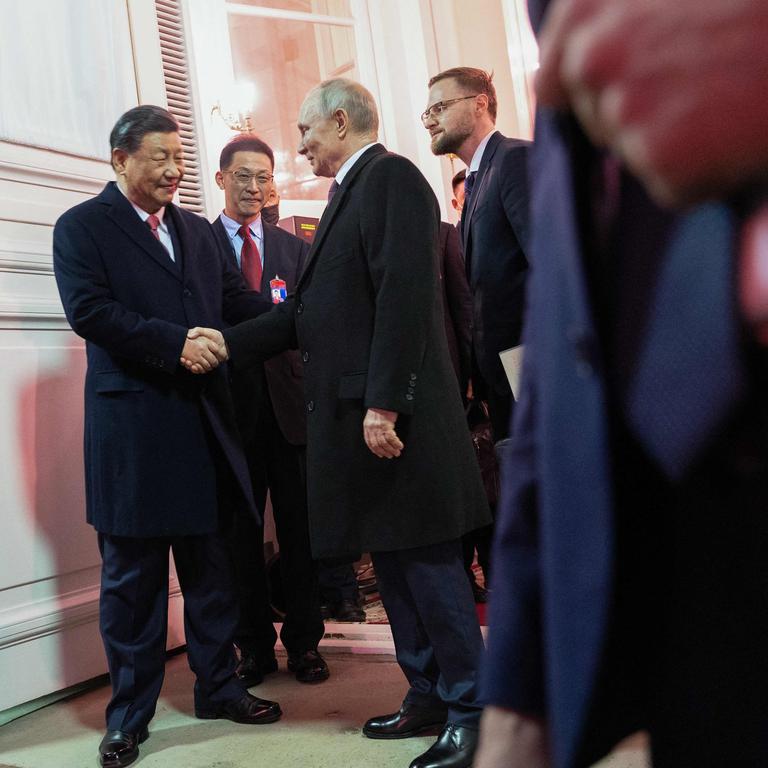
But he believes the China situation can still be salvaged.
“China’s not going anywhere. Nor is the United States,” he says. “But we don’t have a sense of what for China is an ambit claim and what they see as integral to their national security.
“Part of the cut and thrust of diplomacy and international relations is to ensure that everybody gets what they need without recourse to war. I think there is a possibility that that option is still very much open with China. Diplomacy, diplomacy and more diplomacy!”




